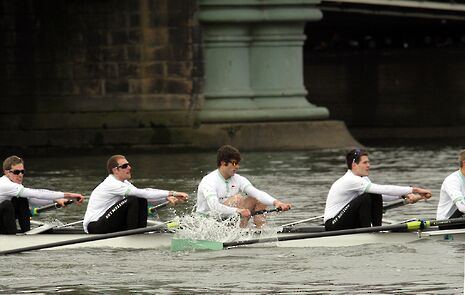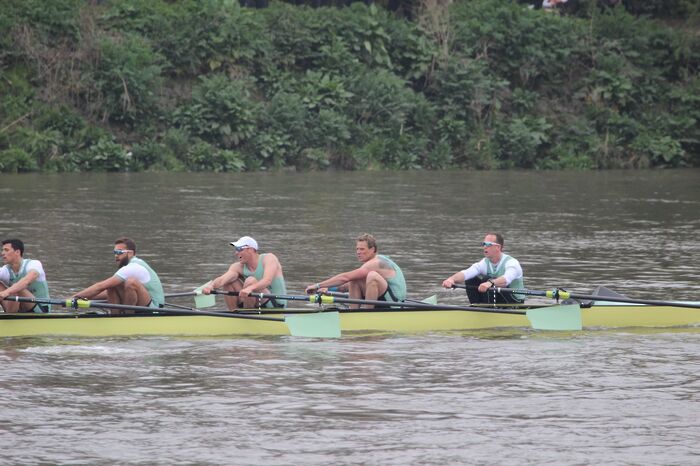‘It was the best I’ve ever felt’, said ex-Olympian George Nash on winning the Boat Race
St Catherine’s graduate and two-time Olympic medallist George Nash opens up on retirement, London 2012 and the true cost of rowing at Cambridge

George Nash speaks to me from a car. The line rattles and breaks up with his journey – presumably from the Kinetrol factory in Farnham where he works, once as a Development Engineer, now as one of its Technical Directors.
Nash’s work right now may not command quite the same intrigue in conversation. But he was lucky: unlike many top-level athletes, life did not stop after retirement, and for that he is immensely grateful.
“I had been working very part-time from 2013,” he explains. “I [...] got involved with a few projects and felt that I had found something I could move on to. Most athletes find it very difficult to get excited about something after professional sport. I did through blind luck basically.”
Nash was 26 when he rowed his last race for Great Britain at the Rio Olympics and secured his first gold. It was an apt climax to a decade representing GB which included three World Championship golds (2013 and 2015 in the eight; 2014 in the men’s coxless four), two European golds in the four in 2014 and 2016, and an Olympic bronze with childhood friend Will Satch in London 2012.
But Nash might easily have completed another Olympiad. In another world, he would now be in the midst of a gruelling winter training block ahead of Tokyo. Does he hanker after those days at all?
“I would be lying if I said no,” he says.
“One of the things I learnt to love about rowing was having to turn up on the day and compete at your very best against the best in the world knowing that if it didn’t go perfectly you are throwing away a year or four years of your life. The nervous energy would be through the roof. That intensity gets kind of addictive in a way.”
"One of my teammates missed the birth of two of his children for training"
Though Nash still burns with competitive hunger, it is refreshing how ready he is to admit that the daily rigour of training was difficult, sometimes just too much. “Everything else in your life has to take a back seat,” he puts it. “One of my teammates missed the birth of two of his children for training.”
Nor does Nash affect that kind of flashy masochism athletes can be a little guilty of playing up to. “I had thought if I win the Olympics I’ll call it a day and try something else. I don’t regret that decision. I absolutely loved the sport – still do. But I had a great time at the top and that was enough for me.”
When he crossed the finish line for the last time in Rio – after the wave of nauseating relief – he admits there was only satisfaction that it was all over.
“The [London] Olympics felt like I was just turning up on the day and giving it a whirl,” he explains. “We’d had a torrid set of training camps leading in. When I came away with a bronze I was completely elated. With Rio we had spent three and a half years training with a kind of military ethos.
“I felt a strong sense of mission accomplished [when we won gold in Rio]. It wasn’t intense elation. It was just like all right, done.” He pauses, catching himself, then chuckles: “That sounds pretty grim actually.”
Nash graduated from St Catherine’s in 2013 with a degree in Mechanical Engineering. Rowing dominated his student life. Amazingly, Nash spent his first year in the Goldie crew, but he broke into the Blues squad in his second year and starred in three Boat Races in 2010, 2011 and 2013, when he was President of the Boat Club.
“When I arrived at Cambridge I knew I wanted to try as hard as I possibly could to making the Olympic team,” he says.
But Nash’s enterprise came at a cost. He remembers the immense mental strain of balancing a rigorous four-year course with each Boat Race campaign.
“I now regret not putting more into my degree because I find the subject matter that I was falling asleep to at Cambridge hugely engaging,” he laughs.
For all its military rigour, Nash says the leadup to the Rio Games felt like a holiday by comparison. He treasures the people he met and the experiences his time at the University granted him, but, he adds: “I’m really glad I did it all but it’s not something that I really miss. A lot of the time it was on the verge of being too much.”
It becomes clear why when I ask Nash about the Boat Race. Besides all the media attention, the stakes were so high every year simply on a human level.
“It’s very short, it’s very intense and everyone on the team is completely desperate to win and completely desperate to make the boat. Consequently, the environment is always on the edge of blowing up. To win is a massive release of pent up pressure. Winning in 2010 was awesome. It’s probably the best I’ve ever felt after a rowing race.”
The pendulum of the Boat Race has decidedly swung back in Cambridge’s favour in recent years. Oxford won all four races in 2013, ’14 and ‘15. But in 2020 Cambridge’s women Blues will be defending their crown for the fourth successive year, and the men for the third after they secured back-to-back victories for the first time since 1999.
Callum Sullivan took gold in the eight at the U23 World Championships this summer, while this year’s president Freddie Davidson won the title in the coxless four. Nash bagged a gold at the same event in 2011, racing in a pair with Oxford counterpart Constantine Louloudis.
“I think Freddie’s one of the best technical oarsmen that have rowed at Cambridge. Probably ever,” Nash said. “And Callum seems to get better and better. He’s a huge asset for the club. Both of them are linchpins.”
The pair have some task living up to Nash’s ability. For better or for worse, the person who was shaped by those 10 years of sacrifice was a supremely accomplished rower befitting of Britain’s decorated four that has seen the likes of Steve Redgrave and James Cracknell. And he has memories that will never leave him.
“That Rio 4 was outstanding,” Nash says, noting one race where they “came within half a second of breaking the world record. For me that was a perfect race. That’s the most proud I’ve ever felt in a boat.”
 Interviews / Lord Leggatt on becoming a Supreme Court Justice21 January 2026
Interviews / Lord Leggatt on becoming a Supreme Court Justice21 January 2026 Features / Are you more yourself at Cambridge or away from it? 27 January 2026
Features / Are you more yourself at Cambridge or away from it? 27 January 2026 News / Reform candidate retracts claim of being Cambridge alum 26 January 2026
News / Reform candidate retracts claim of being Cambridge alum 26 January 2026 News / Report suggests Cambridge the hardest place to get a first in the country23 January 2026
News / Report suggests Cambridge the hardest place to get a first in the country23 January 2026 News / Cambridge psychologist to co-lead study on the impact of social media on adolescent mental health26 January 2026
News / Cambridge psychologist to co-lead study on the impact of social media on adolescent mental health26 January 2026










